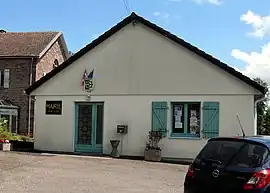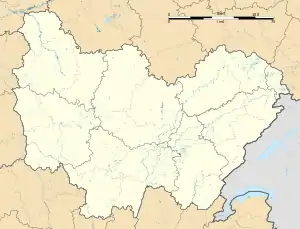La Bruyère | |
|---|---|
 The town hall in La Bruyère | |
 Coat of arms | |
Location of La Bruyère | |
 La Bruyère  La Bruyère | |
| Coordinates: 47°49′53″N 6°29′07″E / 47.8314°N 6.4853°E | |
| Country | France |
| Region | Bourgogne-Franche-Comté |
| Department | Haute-Saône |
| Arrondissement | Lure |
| Canton | Mélisey |
| Government | |
| • Mayor (2020–2026) | Bernard Girard[1] |
| Area 1 | 6.32 km2 (2.44 sq mi) |
| Population | 186 |
| • Density | 29/km2 (76/sq mi) |
| Time zone | UTC+01:00 (CET) |
| • Summer (DST) | UTC+02:00 (CEST) |
| INSEE/Postal code | 70103 /70280 |
| Elevation | 309–426 m (1,014–1,398 ft) |
| 1 French Land Register data, which excludes lakes, ponds, glaciers > 1 km2 (0.386 sq mi or 247 acres) and river estuaries. | |
La Bruyère (French pronunciation: [la bʁɥijɛʁ]) is a commune in the Haute-Saône department in the region of Bourgogne-Franche-Comté, in eastern France.
It was the birthplace (1874) of Albert Mathiez, a prominent historian of the French Revolution, born to a very local innkeeper's family, who later moved to the city of Paris and achieved a successful academic career.[3]
See also
References
- ↑ "Répertoire national des élus: les maires" (in French). data.gouv.fr, Plateforme ouverte des données publiques françaises. 13 September 2022.
- ↑ "Populations légales 2021". The National Institute of Statistics and Economic Studies. 28 December 2023.
- ↑ Jean Dautry, "ALBERT MATHIEZ, HISTORIEN DE LA RÉVOLUTION FRANÇAISE", Annales historiques de la Révolution française, 34e Année, No. 168 (Avril-Juin 1962), pp. 129-151
Wikimedia Commons has media related to La Bruyère (Haute-Saône).
This article is issued from Wikipedia. The text is licensed under Creative Commons - Attribution - Sharealike. Additional terms may apply for the media files.